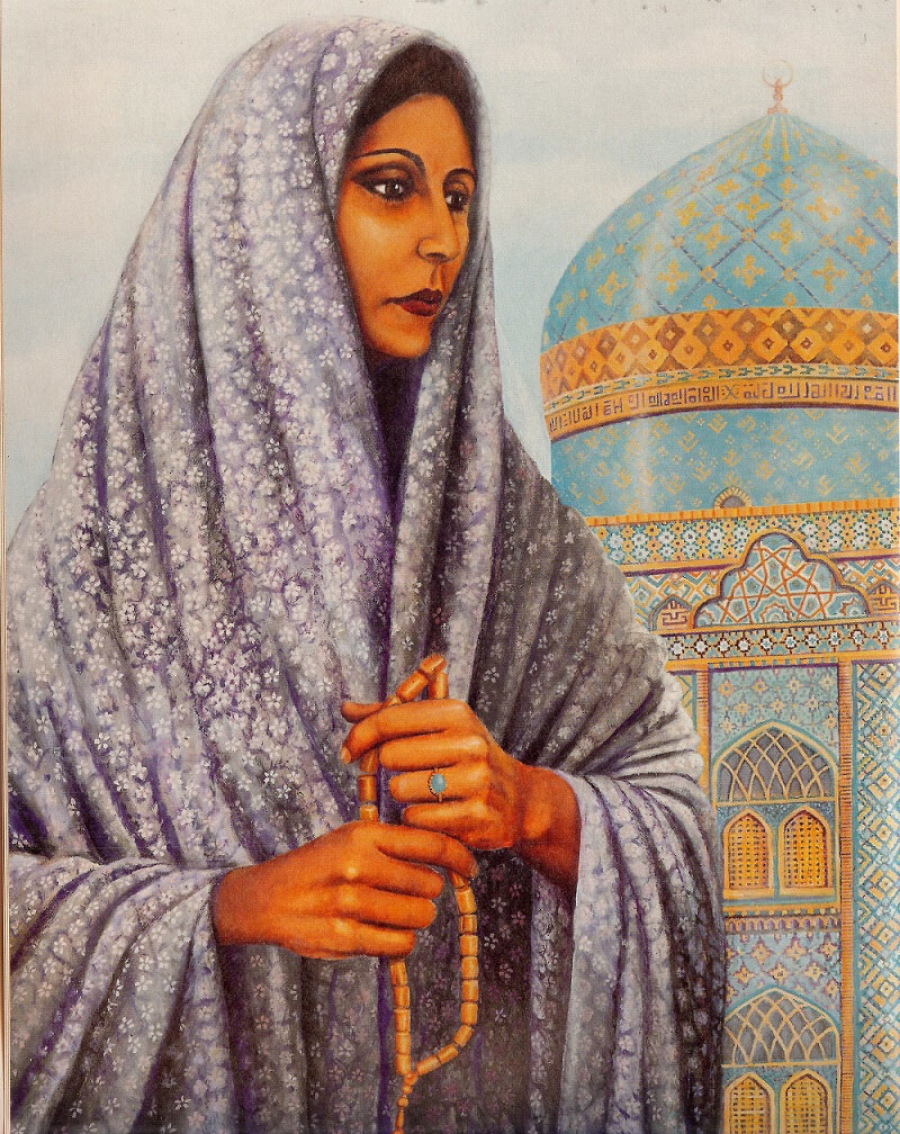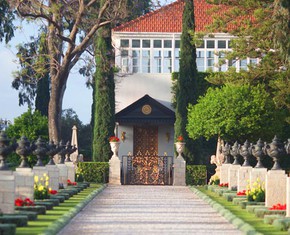The views expressed in our content reflect individual perspectives and do not represent the authoritative views of the Baha'i Faith.
In the 19th Century, the Persian male protected his chief possession by secreting it away and surrounding its merits with mystery. He veiled his wife with stone and iron as well as with fabric.
A Persian home of that period resembled a prison – with women in solitary confinement at its insulated, isolated center. That this cloistered core of every home was called an andaruni, or sacred place, hardly blessed it with high regard by its female inmates.
With their entire lives confined inside the walls of a household, Persian women could take no part in public affairs. They could not even have a voice in their own personal fates. Just to ask a Persian man about a certain woman in his family was considered discourteous, if not insulting. It was deemed invasive and offensive even to ask the name of a man’s wife. More properly she would be referred to as “the person in the house” or, if she were so blessed as to have a son, she might be designated as “the mother of so-and-so.”
At that time and in that culture, a woman was not an individual – her existence was associative only to a man’s existence.
Such a constrained and claustrophobic environment for Persian women makes Tahirih’s bold proclamation in July of 1848 all the more remarkable.
At the Conference of Badasht she removed her obligatory facial veil and declared the emancipation of all women everywhere. Her courageous act occurred two weeks before the famed Seneca Falls Convention in upstate New York.
Not a whimsical or merely personal gesture, Tahirih’s daring deed that day happened in coordination with both the Bab and Baha’u’llah. Separated in space but united in purpose, those two messengers of God both proclaimed that a New Day had dawned. The Bab did so by transforming a public tribunal in Tabriz, convened to humiliate him, into a platform for announcing he was the Promised One of all religions.
Meanwhile, Baha’u’llah galvanized the early followers of the Bab as dawn-breakers of this new day of progressive change. Among these evolutionary teachings, Abdu’l-Baha, the son of Baha’u’llah, elaborated on the one dramatically proclaimed by Tahirih:
The world of humanity has two wings – one is women and the other men. Not until both wings are equally developed can the bird fly. Should one wing remain weak, flight is impossible. Not until the world of women becomes equal to the world of men in the acquisition of virtues and perfections, can success and prosperity be attained as they ought to be. – Selections from the Writings of Abdu’l-Baha, p. 227.
These enlightened, revolutionary teachings, as well as the heroic characters associated with them, are familiar to most readers of Baha’i history – but less familiar is a woman who might be considered a foil to Tahirih.
In 1848, the wife of Muhammad Shah, Mahd Ulya, asserted her own onerous version of women’s rights. Determined to see her teenage son succeed her dying husband as shah, the Royal Mother connived to eliminate all rivals and to hasten the king’s demise. Her intent: to rule through her son, not in the light of 1848’s unfolding new consciousness (this was the “Year of Revolution” in Europe), but in the darkness of age-old tyranny and intolerance.
Although born into a prominent Qajar family, Mahd Ulya had been the usual female pawn in a male-centric society. As part of an ambitious scheme of genealogical engineering, initiated by the previous Persian king, she had been married at the age of 14 to the 11-year old boy who would become Muhammad Shah. However, Mahd Ulya shrugged off the veil of illiteracy under which Muslim girls were raised and taught herself both Persian and Arabic. Soon well-versed in literature, she also managed to become an accomplished calligrapher.
Meantime, Mahd Ulya’s determination to be free of female constraints concerning education extended to those regarding marriage. After departing on a distant expedition, her young husband once sent for his wife to join him. In response, Mahd Ulya purchased a slave-girl, whom she sent as a gift, instead of going herself. That she had various lovers soon became a well-known secret. Mahd Ulya’s alleged incestuous relationship with her brother may have only been a ploy to discredit her; however, other charges of adultery were more difficult to dismiss as mere fabrications. Mirza Aqa Khan, Grand Vizier during the 1852 massacre of countless Babis in Tehran, was commonly believed to be one such former lover.
Even after her husband’s accession to the Peacock Throne, Mahd Ulya’s extramarital affairs continued. Her late night riotous parties soon scandalized Muhammad Shah. “Madam?” he once beseeched her, “can you not be more discreet?” Finally, her affair with the chief steward of the palace, Ali Khan, became so barefaced that Muhammad Shah was forced to exile him.
However, once Muhammad Shah died and Mahd Ulya succeeded in seating her 17-year old son upon the Persian throne, she brought her lover back from exile. Then she manipulated young Nasir al-Din Shah into naming Ali Khan chief of the royal household. In this high-ranking position, this brutal man supervised Tahirih’s strangulation in 1852, as well as ordering the bloodletting of thousands of other Babis that summer.
For years, Mahd Ulya had wanted Baha’u’llah dead. She perceived the popular nobleman from the province of Nur as a political threat. However, because Baha’u’llah came from an illustrious family and was well connected at court, she had not been able to accomplish her murderous goal. But in 1852, when three crazed Babis attempted to assassinate young Nasir al-Din Shah, Mahd Ulya seized her opportunity. Blaming all Babis for her son’s gunshot wound, she had them all rounded up and thrown into the Siyah-Chal dungeon, the infamous “Black Pit,” including Baha’u’llah:
We were consigned for four months to a place foul beyond comparison … a dark and narrow pit were preferable … The dungeon was wrapped in thick darkness … No pen can depict that place, nor any tongue describe its loathsome smell. Most of these [Babi] men had neither clothes nor bedding to lie on. God alone knoweth what befell Us in that most foul-smelling and gloomy place! – Baha’u’llah, Epistle to the Son of the Wolf, pp. 21-22.
Vociferous in demanding the blood of Baha’u’llah, Mahd Ulya attempted, through the instrumentality of her rapacious lover, to poison him. Meanwhile, every day various Babi prisoners were led from the dungeon and cruelly tortured to death. In describing these horrific deaths, the Baha’i chronicler Nabil, depicted not only Mahd Ulya’s venomous hatred for Baha’u’llah, but also her abject failure to extinguish the light of the new day:
All this suffering and the cruel revenge … failed to appease the anger of the Shah’s mother. Day and night she persisted in her vindictive clamour, demanding the execution of Baha’u’llah, whom she still regarded as the real author of the crime. ‘Deliver him to the executioner!’ she insistently cried to the authorities. “What greater humiliation than this, that I, who am the mother of the Shah, should be powerless to inflict upon that criminal the punishment so dastardly an act deserves!’ Her cry for vengeance, which an impotent rage served to intensify, was doomed to remain unanswered. Despite her machinations, Baha’u’llah was saved from the fate she had so importunately striven to precipitate. The Prisoner was eventually released from His confinement, and was able to unfold and establish, beyond the confines of the kingdom of her son, a sovereignty the possibility of which she could never even have dreamed of. – The Dawn-Breakers, p. 635.
We appreciate all the more why those early Babi martyrs were deemed “Dawn-Breakers” when we see the depraved moral darkness they had to break through.
Tom Lysaght’s new book Persian Passion is now available on Amazon.com

















Comments
Sign in or create an account
Continue with Googleor